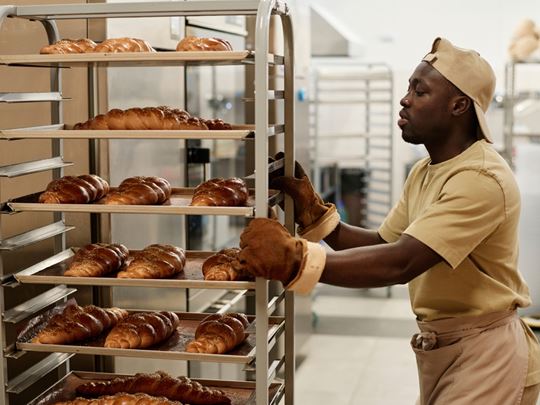Benefits of Having a Part-Time Job
The most obvious benefit of having a part-time job is earning money to spend on whatever you wish. However, there are a few other benefits:
- They can help you discover the type of career you can see yourself doing long-term.
- You’ll gain experience that’ll improve your CV and chances of landing future jobs.
- You can highlight skills and knowledge gained from working part-time on applications for further education and training.
- Having your own income will help you learn how to manage your money.
- You’ll gain transferable skills, such as time management and communication, making you better prepared for independence.

Things to consider when finding a part-time job
What age can I start working part-time?
In the UK, you can start working when aged 13 – 16; however, there are some restrictions to protect you and ensure your education won’t be impacted by working:
- Your employer must have a permit from the education department of your local council to employ children.
- You can work on a school day and Sunday for no longer than 2 hours.
- You can work on a Saturday for no longer than 5 hours if you’re 13-14 and 8 hours if you’re 15-16.
- You can work before school for no longer than 1 hour.
- Working hours must be after 7 am and before 7 pm.
- Your employer must allow you to have a break every 4 hours.
- Your employer must give you a break from work for at least two weeks during the school holidays.
- You won’t be able to work in an environment that could put your well-being at risk, such as a factory.
- During term time, you can work up to 12 hours per week.
- During school holidays, you can work up to 25 hours per week if you’re 13-14 and 35 hours if you’re 15-16.
- During school holidays, you can work on weekdays and Saturdays for up to 5 hours if you’re 13 – 14 and up to 8 hours if you’re 15 – 16 and on Sundays for up to 2 hours.
When you’re aged 16-18, restrictions are less rigid. You can work up to 40 hours a week and up to 8 hours a day with a break after four and a half hours. You’ll also be entitled to the national minimum wage for your age group.
How will working impact my life?
The idea of earning money and having more freedom might sound enticing, but you should consider your long-term goals and well-being before committing to a job.
Whilst there are limits on how many hours you can work, it doesn’t mean you should work the maximum hours if it impacts your ability to complete homework, revise for exams, see friends, and do the things you love.
Many companies offer flexible and zero-hours contracts, giving you more control over your working hours. Some employers also issue contracts with fewer hours but offer overtime, so you can always do more hours during the school holidays. You could also apply for a temporary job, so you can take a break from working when the contract ends.
If you’re wondering how many hours to work, ask your foster parents for advice. Schools also usually provide their own guidance on the maximum hours you should work to prevent you from falling behind in your education.
What type of job should I apply for?
Jobs for 13 – 16 year olds
When aged 13– 16, job opportunities are limited. You can apply for ‘light work’ positions, such as a paper round or stacking shelves in local newsagents. However, due to regulations, many companies will only employ individuals who have reached school leaving age.
You could instead talk to people in the community and your network to see if they need any help with odd jobs, such as car washing, lawn mowing, pet sitting and cleaning. If you do a good job, they may recommend you to a friend, leading to more opportunities. You can also highlight the skills you’ve gained through these odd jobs on your CV, so you’ll be in a better position for employment when you turn 16.
Jobs for 16 – 18 year olds
When you reach school leaving age, you can apply for a broader range of part-time positions. Regardless of the job you choose, the skills and knowledge you gain will look fantastic on your CV, but if you have a particular career in mind, you could apply for jobs related to your chosen field.
Here are some example jobs and the careers they could lead to:

Library Assistant
If you’re a bookworm and can see yourself writing a book or teaching English one day, working as a library assistant could boost your CV and make your personal statement stand out.
What does the job involve?
Library assistants usually help more senior staff with the day-to-day running of the library. Duties could include:
- Organising books onto library shelves.
- Ensuring the library is clean and tidy.
- Checking books in and out.
- Supporting library users in finding resources and book titles.
- Data Entry.
- Managing enquiries via email, telephone and social media.
- Managing incoming and outgoing mail.
- Creating displays and setting up for events.
- Helping with events, such as kid’s activity days and story time.
Dog Kennel and Cattery Assistant
If you love animals and are considering a career as a vet or dog groomer, you could work part-time at a dog kennel or cattery. Not only will you gain some hands-on experience, but you’ll be demonstrating to future employers and further education providers that you have a passion for animal welfare.
What does the job involve?
As a dog kennel or cattery assistant, you’ll help your colleagues care for pets by completing tasks such as:
- Exercising the dogs.
- Cleaning out pet housings and providing fresh bedding.
- Ensuring the pets have food and water.
- Playing with the pets.
- Giving pets their prescribed medication.
- Brushing pets and giving them lots of love.
Care assistant
If you’re a people person who wants to make a difference by becoming a doctor or nurse one day, you could become a part-time care assistant. This job role will give you an insight into caring for people in need alongside gaining some excellent experience and training to emphasise in university applications.
What does the job involve?
Care assistants have a varied role, but empathy and communication are key to carrying out duties such as:
- Helping residents go to the toilet, wash and dress.
- Supporting colleagues in preparing food.
- Assisting residents with eating.
- Housekeeping, such as stripping and making beds.
- Talking and listening to residents.
- Organising activities and days out.
- Helping residents to pursue their hobbies and exercise.
Lifeguard
If you’re a strong swimmer and see yourself as a swimming teacher, saving lives as a paramedic or working for the RNLI, lifeguarding could be your ideal job. Many employers offer on-the-job training, and you’ll receive a National Pool Lifeguard Qualification (NPLQ). Plus, free gym membership is often a perk of the job.
What does the job involve?
Although your primary role will be monitoring the swimming pool to ensure the safety of pool users, other responsibilities may include:
- Rescuing people from the water.
- Performing first aid and CPR.
- Enforcing swimming pool safety rules, for example, ensuring members of the public don’t dive into the shallow end.
- Ensuring the pool, poolside and changing facilities are clean and safe.
- Completing safety checks.
- Welcoming customers and dealing with queries.
Theme Park ride operator
If you’re a thrill seeker with a dream of becoming an engineer who designs rollercoasters, why not consider a part-time job at a theme park as a ride operator? You’ll be surrounded by engineering excellence, and if you work for a Merlin resort, you’ll receive a pass that allows you, your friends and family to visit all their attractions for free.
What does the job involve?
Theme Park ride operators help customers have a safe and wonderful day out, and the role may include:
- Performing safety checks and inspections on rides.
- Assisting customers with getting on and off rides.
- Ensuring customers comply with safety rules, such as removing loose items of clothing.
- Selling merchandise and rider photos.
- Maintaining the cleanliness of rides.
There are many other jobs you could consider, such as barista at a local coffee shop, babysitting, warehouse assistant, retail assistant and waiting on tables in a restaurant.
When considering which job to apply for, assess your current skills. For example, if you can’t swim, applying to become a lifeguard would be unrealistic. Instead, play on your strengths. If you have excellent communication skills, a customer-facing role in retail would be more appropriate. If there is a job you’d love but don’t yet have the essential skills for, you can spend time building them before applying.
Where is the best place to look for jobs?
Whether you already know the type of job you’d like to apply for or are looking for inspiration, the best places to look for part-time work include:
- Job search engines – websites like Indeed make it super easy to search for employment, allowing you to filter jobs by title, location, contract type and more. There are also student-specific websites that tend to advertise flexible and part-time employment opportunities.
- Social media – businesses often advertise job openings through LinkedIn, Facebook and Instagram.
- Company websites – some organisations will only advertise openings on their own website, so if there is a company you’d particularly like to work for, head to their website to see if they have any vacancies.
- Job fairs – some focus solely on long-term careers; however, businesses looking for flexible workers, like students, may also attend. So, it’s worth heading to a local job fair to meet potential employers.
- Community notice boards – you can sometimes find casual work on local notice boards in your community hub or newsagents.
- Your network – If you know someone employed at a local company, they can inform you about job openings and may even be able to recommend you, giving you a better chance of securing a role.

The Job Application Process
Once you know the type of job you’d like, it’s time to start applying and, if you haven’t already, building your CV so it highlights the skills, knowledge and experience you can bring to the role.
Building your CV
These days, many jobs require you to fill in an application form on their website; however, it’s still worth creating a CV so you have easy access to a list of your skills, knowledge and relevant experience.
Many CV templates are available to download online, which is a good starting point for creating your first CV. Here are the main things you should include in your CV:
- Name, address and contact details.
- Write an introduction summarising your skills and qualities, including anything relevant you’re particularly proud of and the type of job you’re hoping for.
- List your core skills, such as attention to detail, time management, communication, digital literacy and resilience. You could also explain how you’ve obtained these skills.
- If you don’t have an employment history, you can highlight the transferable skills you’ve acquired through extra-curricular activities and any work experience you’ve completed through school.
- Add your education and qualifications. If you are waiting on results, you can include your predicted grades.
- Include your hobbies and interests to give employers insight into your personality.
- Add two references – you can ask a teacher, tutor and leaders of your extra-curricular activities. Include their name, e-mail address and contact number.
Writing a cover letter
If the job you’re applying for requires you to apply with a CV, you’ll need to write a cover letter specific to the company and job you are applying for. Research the company and job description thoroughly so you can highlight your relevant skills in relation to the job. The job description will usually tell you who you need to address the letter to, and you should also reference the job title.
Begin the letter by explaining why you want the job before going into further detail about any knowledge, skills and experience you can bring to the role. If you find it difficult, do a quick Google search for sample cover letters, and ask your foster parents to proofread your cover letter before sending it.
Next Steps
Sometimes, the application process will move directly from application to interview; however, many companies now require you to complete a screening assessment. They may ask you questions about everyday situations in the workplace to gauge your personality or ask you to complete a basic maths and English test. Don’t panic; take your time and complete the assessments in a quiet area free from distractions.
Interview
Once you’ve applied and completed any screening assessments, the employer will short-list the candidates they want to interview and usually contact them via email. If they contact you, it’s time to do some interview prep:
- Research the company in more detail, including values, competitors and structure. Use their social media platforms and check if they’ve recently been in the news.
- Reread the job description, ensuring you really know what the job entails.
- Consider the questions they may ask you, and prepare some answers using information on your CV, such as experience, skills and knowledge. Break your answers down into the situation you faced, the task that needed completing, the action you took and the results. This is known as the STAR format.
- Print off a copy of your CV and make notes that you can refer to during the interview.
- Prepare some questions to ask the people interviewing you.
- Practise your interview technique with friends or your foster parents.
- Dress in business casual to make a good impression and prepare your clothes the night before.
- Ensure you know where you need to go and organise transport.
- Arrive at least 15 minutes before the interview.
During the interview, they’ll usually tell you when they plan to let applicants know if they’ve got the job or not. However, if this time passes and you haven’t heard from them, you can always send a short follow-up email reminding them of your interest in the role.
If you’re ready to apply for your first job, why not spend some time creating a CV and browsing job search engines to find out what’s available in your area?
Need a little help or advice?
Handbooks & Guides?
Are handy handbooks are designed with you in mind, full of helpful information for both you and your foster family.
Independents
Are you about to be independent or have you already left? Find support and information here and remember to stay in touch.
Have your say
We are here for you, have your say on topics you want to read, give us your feedback or contribute to your foster parent’s review.
Kids of Carers
We offer help and support to birth children and young people whose parents are foster carers.





